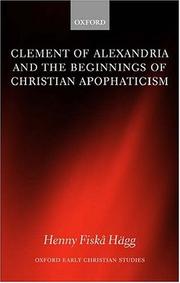| Listing 1 - 1 of 1 |
Sort by
|

ISBN: 9780199288083 0199288089 019160416X 1281154598 9786611154592 1435624165 0191537101 Year: 2006 Publisher: Oxford Oxford university press
Abstract | Keywords | Export | Availability | Bookmark
 Loading...
Loading...Choose an application
- Reference Manager
- EndNote
- RefWorks (Direct export to RefWorks)
Can humans know God? Can created beings approach the Uncreated? The concept of God and questions about our ability to know him are central to this book. Eastern Orthodox theology distinguishes between knowing God as he is (his divine essence) and as he presents himself (through his energies), and thus it both negates and affirms the basic question: man cannot know God in his essence, but may know him through his energies. Henny Fiska Hagg investigates this earliest stage of Christian negative (apophatic) theology, as well as the beginnings of the distinction between essence and energies, focusing on Clement of Alexandria in the late second century. Clement's theological, social, religious, and philosophical milieu is also considered, as is his indebtedness to Middle Platonism and its concept of God.
Negative theology --- Théologie négative --- Christianity --- History of doctrines. --- Christianisme --- Histoire des doctrines --- Clement, --- Theologie negative --- -276 =75 CLEMENS ALEXANDRINUS --- 231.133.11 --- Apophatic theology --- Via negativa (Theology) --- Theology --- Mysticism --- -History of doctrines. --- Griekse patrologie--CLEMENS ALEXANDRINUS --- Kenbaarheid van God --- Clemens, --- Clemens, Titus Flavius, --- Clément, --- Clemente, --- Klemens, --- Klēmens, --- Kliment, --- Titus Flavius Clemens, --- إكليمنضس السكندري --- 231.133.11 Kenbaarheid van God --- Théologie négative --- Christianity. --- 276 =75 CLEMENS ALEXANDRINUS --- Christianity&delete& --- History of doctrines --- Klēmēs, --- Negative theology - Christianity - History of doctrines. --- Theologie negative - Christianisme - Histoire des doctrines --- Clement, - of Alexandria, Saint, - ca. 150-ca. 215.
| Listing 1 - 1 of 1 |
Sort by
|

 Search
Search Feedback
Feedback About UniCat
About UniCat  Help
Help News
News